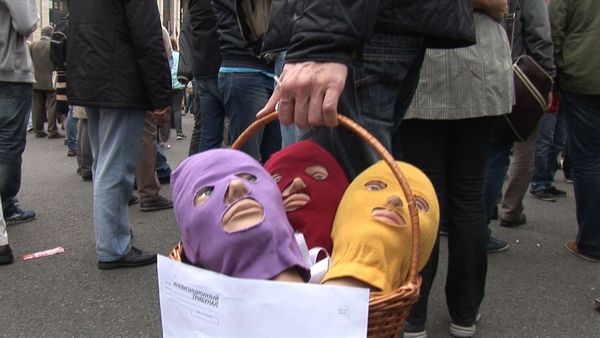Eye For Film >> Movies >> Act And Punishment (2018) Film Review
Act And Punishment
Reviewed by: Jennie Kermode

In 2013, Mike Lerner and Maxim Pozdorovkin's Pussy Riot: A Punk Prayer profiled the three members of the group who were arrested and imprisoned the year before, and sought to explore the music, spectacle and spirit of rebellion that led to them finding themselves in that situation. Yevgeni Mitta's very different documentary shows the three - and those who stood with them - in a very different light. Opening in an art gallery, it uses Medieval paintings to introduce a history of Russian feminism and situate the band within a tradition of political resistance that goes back centuries.
This is an older, wiser Pussy Riot, alert now to what is enduringly important about what they did and continue to do (though it's barely mentioned here, they have now moved on to commenting on international politics). Their perspectives on their own work have changed and they are much less concerned with the posturing and glamour that were important to drawing attention to their early ventures. Instead, in interview, they focus on their longstanding ideas about art and philosophy and their conceptions of how change can be brought about. Surrounding this is archive footage and interviews with establishment figures which illustrates the environment against which they are rebelling - the treatment of other dissenters, restrictive attitudes to women and the increasing closeness between church and state.

This is a film packed with information, visually as well as verbally. Even scenes of the famous trial are intercut with scenes of protest outside the courthouse and reflections on why the accused made the decisions they did. Officials' confusion at their refusal to acknowledge the authority of the court neatly encapsulates a greater state of confusion on the part of those in power. The very idea of women (especially married ones) speaking out seems alien to them, for all that it has happened in the past - a long history of cover-ups by their own forebears leaving them hamstrung in the present. Further, they struggle to understand what Pussy Riot actually hope to achieve through the medium of music. Meanwhile, we see clips of the women acknowledging how weak the musical part of their act was to begin with, and how much it improved when they brought experienced musicians into the team.
For those who enjoy it, there is performance footage included here, but it's sparse - in fact, the women tell us, most of their famous performances didn't last very long, or not much footage survived from them (though sometimes more was helpfully captured by the secret police). Images of the audiences for these impromptu shows are intriguing - confused passers-by, obvious spies, a few people who look as if they're genuinely enjoying themselves, others who simply seem relieved that something out of the ordinary is happening. They form a sharp contrast to the boisterous crowds at gigs by western rock stars who pledge their support after the arrests. Whilst some of these stars faced criticism for appropriating the cause, Pussy Riot stress that the support was welcome and that international visibility helped their movement.
The film ends rather uncertainly, leaving open questions about the women's long term plans, but of course there may be strategic reasons for this. Although it doesn't always seem to know what to do with the wealth of threads it develops, it's a busy and interesting documentary that will provide international audiences with a much richer appreciation of the Pussy Riot phenomenon.
Reviewed on: 16 Jan 2018
















